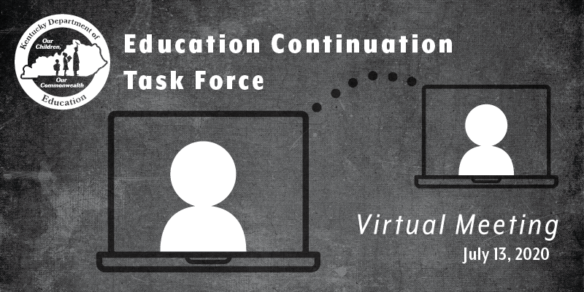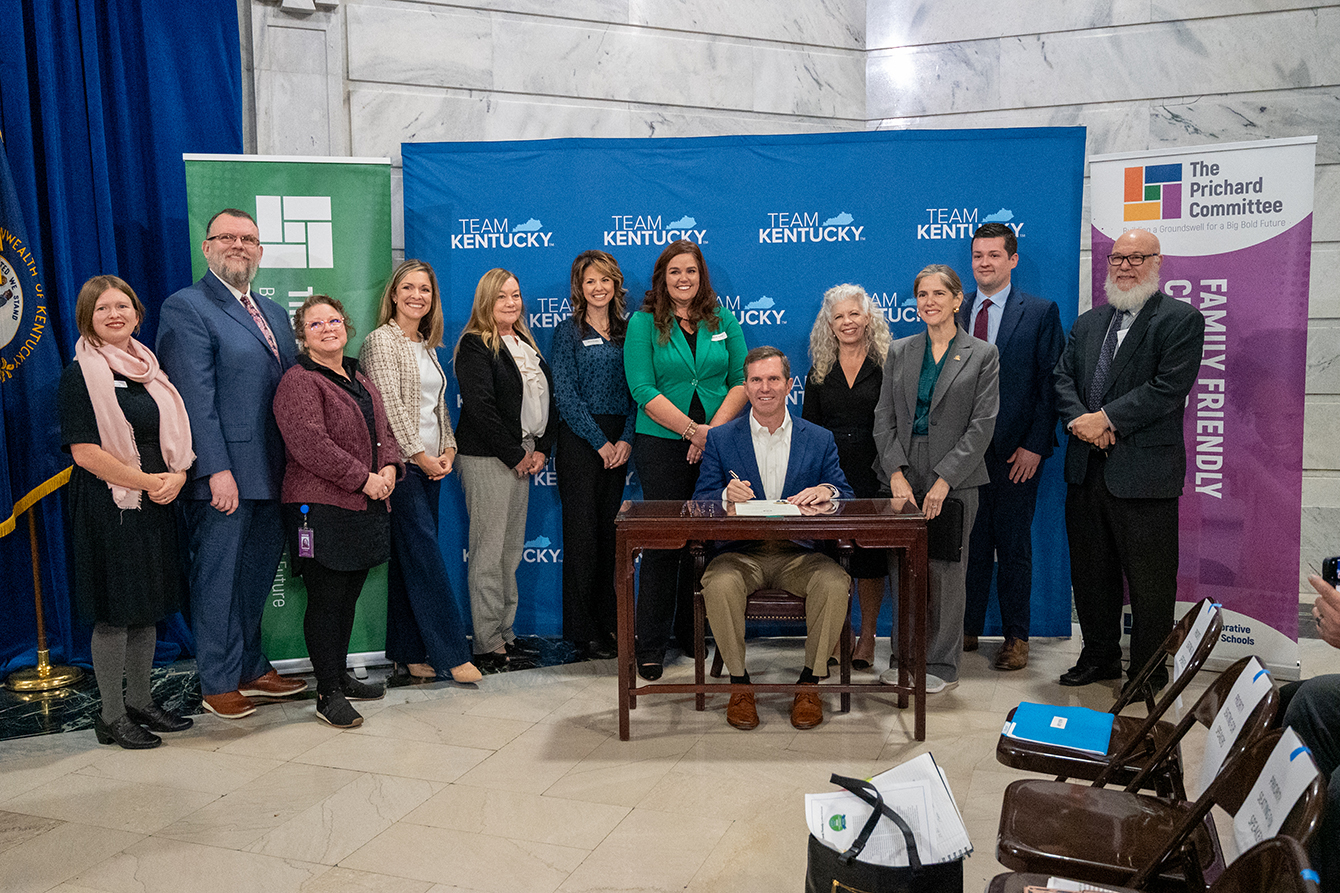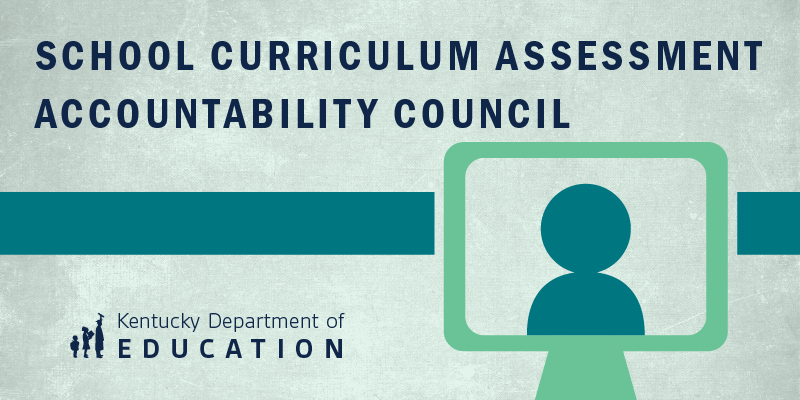
- Expanded Medicaid care allows schools to potentially bill for necessary services provided to Medicaid-eligible students, without the requirement of an IEP.
- State Rep. Tina Bojanowski (Louisville), proposed the idea of allowing teachers the option of wearing masks that have clear inserts so students can see their mouths move as they talk.
By Jacob Perkins
Jacob.perkins@education.ky.gov
During the July 13 Education Continuation Task Force meeting, members convened virtually to learn more about reopening guidance released by the Kentucky Department of Education (KDE).
Tom Thompson, a division director from KDE’s Office of Career and Technical Education and Student Transition, discussed the June 29 guidance on plans for reopening career and technical education (CTE) centers.
The document outlines the governor-approved plan for students to return to secondary CTE labs and classrooms to complete dual credit lab courses and industry certification exams from the 2019-2020 academic year.
As districts begin to develop the reopening plans for their CTE centers, Thompson recommended that they include their local health departments in the conversations. He added that districts should work closely with their designated Healthy at School officer to ensure they have a plan for addressing students who test positive for COVID-19.
Districts should prioritize seniors from the class of 2020 who have not had the opportunity to test or complete dual credit, Thompson said.
Before Kentucky’s CTE centers could open, the Kentucky Community and Technical College System opened each of its 16 campuses to give CTE students the chance to complete their dual credit lab-based classes.
“We learned a lot from their experience … and that has assisted us in providing this guidance,” said Interim Education Commissioner Kevin C. Brown.
On July 6, the department released guidance on workplace health and safety.
“COVID-19 Considerations for Reopening Schools: Workplace Health and Safety” covers five major topics and includes many links to previous guidance from multiple agencies, said Kay Kennedy of KDE’s Office of Finance and Operations.
The guidance recommends that a district develop a protocol for how to handle students who have been exposed to a person who has COVID-19 or students who have tested positive for COVID-19.
A student sent home with COVID-19 symptoms who has a negative COVID-19 test, or when their symptoms have subsided, may return to school once they are fever-free (without fever-reducing medication) for 72 hours and have no other COVID-19-related symptoms.
Julian Tackett, commissioner of the Kentucky High School Athletic Association, asked Kennedy for further clarification on signatory requirements for returning to school. He used an example of a student who previously tested positive for the virus receiving two signatures from the local health department stating they can return, but the school required a statement from a doctor.
Dr. Connie White, deputy commissioner of the Kentucky Department for Public Health (DPH), said the Healthy at School guidance document says a student can return to school when the local health department or the student’s health care provider provides clearance documentation for school records.
Updates from DPH
White and Emily Messerli, immunization branch manager for DPH, also fielded questions from task force members.
State Rep. Tina Bojanowski (Louisville), proposed the idea of allowing teachers – specifically primary school teachers – the option of wearing masks that have clear inserts so students can see their mouths moving as they talk.
“I haven’t seen any studies or research on them, but they do make a lot of sense,” said White.
Donna House, director of the Kentucky Association for Professional Educators, said she has heard from several primary teachers about their concerns about in-person teaching next school year.
“Nothing we do for the next year is going to be like we did it in the past. Everything is going to be different,” said White. “Homecoming is going to be different, how we teach is going to be different, how we parent is different, how we grandparent is different. So, they are absolutely right this will be very different.
“Will it be impossible or unable to be done? No. It will just be something that we will gradually learn to see it … as a new way of living our lives until this pandemic is over.”
Expanded Medicaid Care
KDE staff were joined by the Kentucky Department for Medicaid Services to discuss expanded Medicaid care, which was formerly known as Free Care.
In 2014, the Centers for Medicare and Medicaid Services (CMS) issued a letter to state Medicaid directors clarifying which services Medicaid can reimburse in a school-based setting.
Historically, schools were only able to bill Medicaid if the services provided were outlined in a student’s Individual Education Plan (IEP). Services like mental health assessments, mental health counseling, speech therapy or nursing services provided to students at school without an IEP were not billable.
Kentucky submitted a State Plan Amendment to expand school-based services through Free Care in April of 2019 and this request was approved by CMS in November of 2019.
With the expansion, local school districts can offer any necessary health and behavioral service to eligible students currently covered by Medicaid, regardless of whether it is found on the student’s IEP. In order to seek reimbursement for Medicaid eligible students, the necessary health services that are offered by the school are required to be available to all students for free. Additionally, schools will be able to bill for services provided via telehealth for eligible students.
The program will allow schools to seek additional reimbursement for the mental health services they may already be providing, said Stephanie O’Connor, from KDE’s Office of Finance and Operations. For example, if a student is participating in counseling services through the school, this potentially could be a billable expense under expanded care.
“It’s going to take a couple of years to get the full picture and I think that that’s what’s going to happen here,” Kentucky Department for Medicaid Services Commissioner Lisa Lee said of the program. “As schools move forward, they’ll know what services are needed in their schools.”
Previous coverage of the Education Continuation Task Force:
- First KDE advisory group offers feedback on Healthy at School guidance (June 29, 2020)
- Kentucky Department for Public Health provides five reopening aspects for districts to consider (June 15, 2020)
For more information about COVID-19:
- Kentucky Department for Public Health’s COVID-19 webpage
- KDE’s COVID-19 webpage
- COVID-19 Hotline (800) 722-5725



Leave A Comment